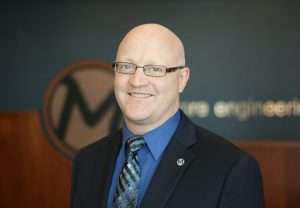
Tyrel Clark’s Feature in AWWA
Tyrel Clark, Water/Wastewater Group Leader at Moore Engineering, has a feature article in the American Water Works Association, Summer 2020 edition.
Read the article below!
Engineers Keep People Safe
The first licensing for engineers was in Wyoming in 1907. Since then, every state has enacted some form of engineering licensure law, the last of which was Montana in 1947. The purpose of these types of laws is to establish levels of training and experience that are required to practice engineering. It also helps people to understand the credentials of the person they are hiring to help them.
The first bar exam for lawyers was in 1773. Medical and dental licensure started around the mid-1800s. To help people who need legal representation, states have laws to prevent unlicensed lawyers from practicing law, and it’s easy to see why you’d want to know your lawyer meets the minimum standard of qualifications if they’re going to represent you; similarly, we all expect our surgeon and anesthetist to have adequate training and experience before we’re willing to undergo an operation. Drinking water and adequate sanitation are similarly life and death considerations, so you should also expect a minimum standard of qualifications from those designing your systems.
The US Centers for Disease Control and Prevention reports there are approximately 801,000 deaths worldwide of children under age five from diarrhea: “Unsafe drinking water, inadequate availability of water for hygiene, and lack of access to sanitation together contribute to about 88% of deaths from diarrheal diseases.” Granted, the bulk of these occur in third world countries, but one of the distinguishing characteristics of third world countries compared to others is the availability of safe drinking water and adequate hygiene. Engineers play a major role in ensuring these are available to the municipals we serve.
That’s not to say engineers are perfect. There are times those same jokes about doctors ‘practicing’ could be applied to engineers. Widely publicized issues such as Flint, MI, water crisis in 2014 illustrate that our system of engineering and drinking water, in general, is not infallible. Another incident I am reminded of regarding water systems is the hepatitis outbreak that cut short the Holy Cross football team’s 1969 season. This infection was traced back to a cross-contamination from an irrigation system coupled with a water distribution system that could not provide adequate fire flows during a nearby fire.
Engineers Save Municipalities Money
Engineers – not unlike doctors and lawyers – have a reputation for being expensive. It’s true that there is a cost to hiring an engineer, but I have seen several instances when good engineering saved a municipality far more than the cost of their engineering fees.
I worked in one town that had a failing elevated storage tank. The easy thing to do would have been to replace it with another elevated tank, but rather than just accept the obvious, we analyzed other alternatives and identified that a ground storage concrete tank could be utilized on a hill near the town. This approach alleviated the need to pump water on a daily basis, and a ground tank was far less expensive than an elevated tank in the long term. These things combined resulted in an estimated savings of millions of dollars over the life of the new tank. Personally, these are my favorite types of projects. People need potable water and sewer services, and if I can make those services less expensive in the long run, it’s very satisfying.
Now, the above example is an extreme case, and not all systems can benefit from engineering to this degree; however, engineers work on projects day in, day out for their whole careers, which gives them a broad range of experiences to draw on. This broader experience allows engineers to consider more options to potentially save money on projects. Including engineering dollars in a project budget can also save on construction costs to make total project costs lower. During construction, they monitor and analyze site work to identify areas where changes can be made to the original design to lower costs, while still meeting state and local regulations.
Engineers Need Your Input
As a group, one of the shortcomings we have as engineers is to think we have all the solutions. As municipalities or others who hire engineers, make sure your voice is being heard. While engineers are experts in our various areas of expertise, no-one knows your water system the way an operator does. City councils have insights about their citizens’ priorities and needs and no amount of training or experience can give your
engineer these insights. The best projects happen when you provide this input as early as possible so engineers can incorporate it into their design and recommendations. It can cost a lot of time and money to backtrack and redesign after changing mid-stream.
Engineers should be able to explain their recommendations to operators and councils, so don’t be afraid to ask questions when working with your engineer. Keep in mind that because an engineer could be risking his or her license to practice engineering by disregarding design regulations, sometimes the answer will be that these standards are required, in which case there may not be much flexibility. As with the doctor administering medicine and performing procedures, these standards have been put in place to reduce risk to the patients – or in the case of a water system, the risk to the users. When it comes down to merely a design choice based on how the engineer was trained, switching over to the city’s priorities is an option and will make the project better.
About the Author
Tyrel Clark is a Professional Civil Engineer and leads Moore Engineering’s Water and Wastewater team based out of the West Fargo, ND, office. He has 10 years of engineering experience involving water and wastewater projects throughout the state of North Dakota and Minnesota. These projects include the planning and design for water treatment and wastewater infrastructure and facilities. Tyrel graduated with a Bachelor of Science degree in Environmental and Civil Engineering from Brigham Young University and is an active member of the American Water Works Association and the Water Environment Federation.

